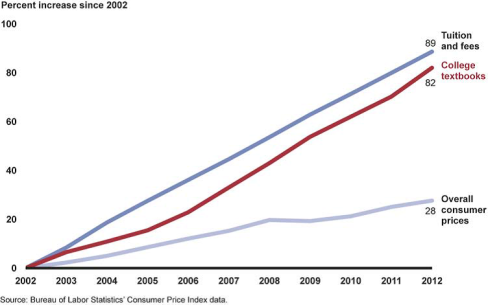By Jeff Knight
College of Southern Nevada students pay for the rising costs of textbooks each semester. Other alternatives, including buying used books online, can save students cash.
According to a 2013 report by the U.S. Government Accountability Office, an independent nonpartisan agency, new textbook prices increased 82 percent from 2002 to 2012. For comparison, overall consumer prices increased 28 percent during the same period.
“Rising costs are linked to the book industry in general and more specifically the historical legacy brought by university and college book selection processes,” says Linda Foreman, CSN sociology professor who has witnessed the rising costs of textbooks firsthand in her many years of teaching.
Teachers like Foreman sometimes choose other options to help students.
“I think we can develop and use many free materials,” Foreman says. “Information on most every topic is on the Web these days and faculty can put together resources that work for their classes easily.”
Foreman, who maintains a library of used textbooks in her classroom, says, “I use older books as happily as newer books. Instructors can place materials in the library for shared use and encourage shared use in classroom activities.”
Ashley Talley, a student in Foreman’s sociology class, thinks this method is very helpful. She appreciates Foreman’s efforts to lessen the burden of costly textbooks.
“The prices are high!” says Amber Sampson, CSN student, commenting on textbook expenses. “I normally get a book voucher but I can recall the semesters when I didn’t have one and the textbook prices really dug into my wallet.”
Like many other students, Sampson looks for other ways to save money on the costs of books. She shops at Amazon, an online retailer, for cheaper priced textbooks. “The book was actually in really good condition,” Sampson says. “There were some markings on pages from the past but the book itself was still intact. I really liked getting decent quality for a good price.”
CSN students can sometimes find free help from other sources.
Major independent publishers such as The McGraw-Hill Companies Inc. and W. W. Norton & Company Inc. offer online-companion websites for students to access additional materials. While some of these study guides are fee based, many are free and can be found through a simple Internet search of the textbook title, author or publisher.




